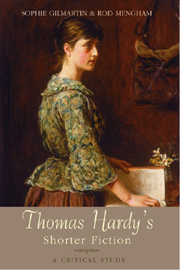Preface
Published online by Cambridge University Press: 12 September 2012
Summary
This compact study of Hardy's short stories provides detailed readings of many individual texts as well as giving an account of the ruling preoccupations and recurrent writing strategies of the entire corpus. It relates the formal choices imposed on Hardy as contributor to no fewer than twenty-four separate periodicals to the methods he employed to encode in fiction his troubled attitude towards the social and cultural politics of the West Country, where most of the stories are set. There is also a close examination of the extent to which the stories bring out, more pervasively than the novels, the problems of author/reader relations that reached a critical phase for Hardy in the 1890s. No previous study has shown how the powerful challenge to readerly competence mounted in the stories reveals the complexity of Hardy's motivations during a period when he was moving progressively in the direction of exchanging fiction for poetry.
It is partly because our study has an historical bearing that we have chosen to deal with the stories in chronological order of publication. But there is another, more compelling, rationale: a particular feature of Hardy's career as a short-story writer is the close relationship he establishes between many (not all) stories in each individual volume. Apart from the situation with A Changed Man, this reflects his practice of collecting into each volume material written within the same relatively short period of time; that chronological condensation often entails historical coherence of precisely the kind that our study is orientated towards.
- Type
- Chapter
- Information
- Thomas Hardy's Shorter FictionA Critical Study, pp. vii - xPublisher: Edinburgh University PressPrint publication year: 2007



